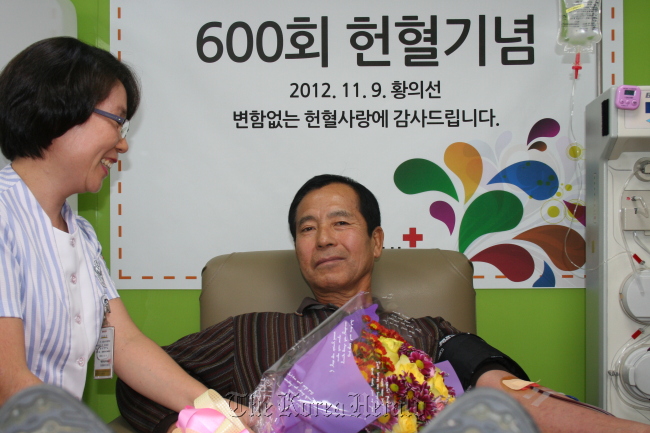Only 3 percent of Koreans donate blood, which is a scary experience for most. But for Hwang Eui-seong, a retired sergeant major, it is a habit that he has done every two weeks for over 35 years.
“I saw on a TV news report that a huge amount of blood was imported from other countries including China,” Hwang said as he recalled a day in 1975 when he began donating blood.
“As an army officer who serves for this country, I could not just sit still and do nothing.”
He recorded his 600th blood donation in early November, becoming the second-most frequent donator in Korea, 41 times short of a man named Sohn Hong-shik.
 |
Hwang Eui-seon, a retired Army sergeant major, makes his 600th blood donation on Nov. 9 at a blood donation center in Seoul. (Korean Red Cross) |
Hwang, 58, cannot wait for two weeks, the time usually needed for the body to replenish blood. The scars on his arms from needles are an insignia.
“I feel proud of myself rather than ashamed of the scars,” he said.
He held a Korean Guinness World Record as the most frequent blood donor in 1997.
Hwang has donated a total of 240,000 milliliters of blood so far, tantamount to the blood of 50 60-kilogram men.
A 2011 statistics published by the Korean Red Cross shows only 1.6 million people donated blood that year, which is around 3 percent of the entire population.
Not only blood, he also donated donor cards for needy fellow soldiers in his Army division in Gyeonggi Province. He gave his donor cards to an army officer and one of his soldiers whose younger sister suffered from leukemia, and donated 350 donor cards to an association for children with leukemia.
The certificate allows a free blood transfusion for those who need blood due to surgery or illness.
The former sergeant major of the army was discharged in 2009 and is currently working at Hong-ik Hospital in Mokdong, southwestern Seoul, as a sanitation worker.
Even though he says he does not work out regularly he seems to still keep in good shape. He has run a full 42.195 km marathon at least once a year for more than 10 years.
Running a marathon is a way that he proved that his health could not be better to his friends or acquaintances who are often hesitant to donate blood.
He first donated in 1975 when he was on a vacation granted by his senior army officer in celebration of his becoming a sergeant first class.
When he went to Yongsan Station in central Seoul to take a train to his hometown Jinan, North Jeolla Province, he saw a strange-looking bus parked in front of the station, which was a mobile blood donation center. He also saw a phrase that read “Your blood donation saves a life” on the windshield.
“And it also said blood type O, which is mine, was urgently needed so I just got on the bus. That is how it all started,” Hwang said.
His family supports him in what he does. His wife prepares low-fat food for him, and his son, 31, and two daughters, 30 and 29, also join Hwang to donate blood.
The son said his father was willing to help to his neighbors whenever they had difficulties.
“My father is the kind of person who had always helped holding funerals for neighbors who had lost their family members,” the son said.
Hwang has donated blood 22 times this year so far.
“Blood donation is like helping people who carry heavy loads,” Hwang said.
He donated whole blood 94 times, platelets 17 times, and plasma the rest of the time.
He chooses the plasma donation most of the time since it takes the least time, two weeks, to do the next round of donation.
He plans to visit a nearby blood donation center this Friday.
By Kim Young-won (
wone0102@heraldcorp.com)







![[Today’s K-pop] Blackpink’s Jennie, Lisa invited to Coachella as solo acts](http://res.heraldm.com/phpwas/restmb_idxmake.php?idx=644&simg=/content/image/2024/11/21/20241121050099_0.jpg)
